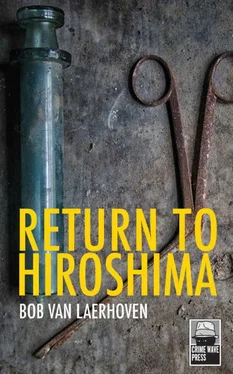“I…”
“Was there a tall woman, half-blonde, half-redhead?”
A shudder ran through Masajiro Amitani’s body.
“I think it would be better if you…”
“No, it would be better if you confessed.” Takeda took off his glasses. The man opposite him blinked.
“Who…?”
“I’m the son of Barbara Gerressen. Does the name ring a bell?”
“No.”
“A Dutch woman.” For the first time in the conversation Takeda removed his cap. Masajiro had made nothing of Takeda’s impoliteness during their last meeting and had seemed equally indifferent on this occasion.
“A Dutch woman with red hair.”
Did Takeda catch a glimpse of recognition, a memory, a flash of guilt, or a dark shimmer of incomprehension?
“I don’t know any Dutch women with red hair.”
“You’re lying. Or should I say: father, you’re lying?”
The man’s lips stiffened. Takeda noticed his left hand tighten around the wheel of his chair, its knuckles white. “Are you mad? I’m not your…”
“What was it like when you raped her? When you penetrated her sumptuous flesh with your war-crazed prick?” The exhilaration felt good, a glorious liberation.
“You’re not my son. I was a soldier. I was following orders.”
“Ah so. Then your superior was to blame. Did he hold your prick and use it as a bayonet to stab the enemy? Is that what you’re saying?”
Masajiro moistened his dry lips. “Of course not. We were soldiers. We had to follow…” His eyes turned towards the door. Takeda was afraid and angry: he didn’t feel the satisfaction he had predicted, at least not as much as he had expected. He felt less and less at ease with the situation. He didn’t know the routine followed by the nursing staff. The previous day he had spent more than an hour with Masajiro without being disturbed. He hadn’t seen a call bell in the room. But who could guarantee that they wouldn’t interrupt them this time round?
“Filthy dog,” said Masajiro from deep in his throat, shaking in his wheelchair with helpless rage. “You are not my…”
Takeda lost control of himself, pulled a syringe from his pocket, waved it in a circle as if it was a dagger and thrust it into Masajiro’s neck. In almost the same movement he jumped to his feet and covered Masajiro’s mouth with his right hand. Masajiro did his best to fight for his life and break free, but his feeble frame was no match for Takeda’s muscle power. The night before, Takeda had taken his wife’s key to her mother’s apartment and filled a syringe with sixty units of insulin from the ampoules in the fridge. On his way out he hesitated, returned to his mother-in-law’s fridge, and added another twenty units. He hid the syringe in his own fridge at home and crept into bed next to his sleeping wife, who was used to his nocturnal escapades. The entire night he had fantasised a hint of recognition, of guilt and regret and panic in Masajiro’s eyes before he put the man out of his misery.
Masajiro’s eyes closed and his body slumped. He was still alive, but his brain cells were disoriented, dying in their droves in the hypoglycaemic shock brought on by the massive overdoses of insulin. He would be dead in minutes.
“Father,” Takeda rasped as he let the man go. “Say something before you die, show some remorse… it’s your last chance.”
Masajiro rolled his eyes and babbled: “The latrines were full of vermin, mostly maggots and… tiny, tiny bodies.” His head fell to his chest as he sunk into a lethal coma.
Takeda started to panic. How long did he have to wait to be sure Masajiro didn’t wake from the coma? What if someone came into the room? He sat down in a chair in front of Masajiro. He had to wait, had to be sure. If anyone came in he would say he was astonished: Masajiro Amitani had fallen asleep in the middle of a sentence. Sweat trickled down Takeda’s forehead. His body seemed to be energized with electricity. He was alone in the world, alone with the man who had robbed him so many years ago of the possibility of enjoying the pleasures of life. The seconds ticked by and felt like hours.
Why did I do it? Takeda asked himself, genuinely surprised. Why?
* * *
It took months before he dared show his mother the dog-tags. Barbara Gerressen emerged from her attempted suicide as a woman who spread overpowering anger in the air around her, like the smell of burning flesh. All that time, corporal Takeda had been waiting for a knock on the door and the police taking him into custody in handcuffs. But the staff at the home where Masajiro lived had apparently blamed his death on the man’s failing health. And even if they had performed an autopsy, there would have been no traces of the overdose of insulin after twenty-four hours.
Takeda told his mother that he had found the dog-tags when he was tidying her room. He asked in a tone that could be interpreted as accusatory if they belonged to his father. The tags had a strange effect on her. She tore them from his hand and threw them away as if they were poisonous. She clenched her fists, her eyes bulged. Her MS had worsened in recent months and her limbs jerked and shuddered. He finally calmed her down and she told him in a toneless voice, distant, as if she was telling someone else’s story, that most of the camp guards made a habit of picking the prettier women to rape. The man she called “that whore-hopper Masajiro” without paying the least attention to the expression on her son’s face was the first.
After getting her pregnant he had threatened to kill her and when the baby was born they both, father and mother, made sure it drowned in the latrines. Barbara Gerressen wasn’t up to raising a child in the camp. Where would she get the energy? She also hated the baby: it was “brown as a coconut”.
This was the first time Takeda had heard about his dead half-brother. Other whore-hoppers followed, Barbara Gerressen continued, but fortunately none of them got her pregnant.
“Six months before the end of the war I had sex with whore-hopper Genkei Akama, your father,” she concluded. She looked at him as if she wanted to see how deeply her words pained him. “You were destined to meet the same fate as your half-brother, but the war ended and that changed everything.”
He noticed her hands tremble as if she felt sorry she hadn’t been able to toss the second baby into the latrines.
I killed the wrong man, thought Takeda. I took all those risks for the wrong man. He roared with laughter as his mother raised her eyebrows in surprise.
On the toll road from Kyoto to Tokyo – Takeda – March 18 th1995
He still has hours of driving ahead of him and tiredness is already weighing heavy, but he’s determined to get to the suburbs of Tokyo before nightfall and take the metro the following morning to the offices of the Public Security Commission. After the storm of the night before, his car has been assailed all day long by broad swathes of almost blinding golden sunlight. Takeda pays little attention to the motorway and the landscape around him. There’s something cardboard about it all, neat and soulless, constructed in haste. His mind is a merry-go-round of half-digested impressions and streams of ideas, a psychic no-man’s-land without horizons. Takeda realises that he’s been living for days with the same rattled feeling he had twenty years earlier when he was sitting in that tiny room with the man he thought was his father, waiting for him to breathe his last. Then, as now, his mind zigzagged back and forth trying to come to grips with a reality that seemed so unreal, so unacceptable.
A new thought makes him tug the wheel involuntarily. If Norikazu and his men have Yori under their control, then the mafia boss now knows about the existence of Beate Becht and that means she could be in danger. His jaws tense. He’s botched up big time, one blunder after the other. Becht is unstable, has already attempted suicide before. It won’t take much to get her to talk. The inspector tries to calm down. What happened, happened. He’s determined not to deviate from his plan. It’s not a good plan, but it’s his only plan. In contrast to the traditional detective novels his wife used to read with such pleasure, the events of the last few days had been nothing but chaos. Takeda had been involved in plenty of investigations in his career that were just as chaotic, hanging together by a thread, the work of the inadequate and the confused. Since murdering the man he thought was his father, Takeda has subscribed to the theory that “normal” life is like being under water: everything is blurred; the people and things around you do the same every day, listless, pointless. But serious crimes propel you to the surface where everything is sharp and unexpected. Suddenly you realise that creatures have followed you from the deep. You see predators you didn’t notice before and they scare the shit out of you.
Читать дальше












